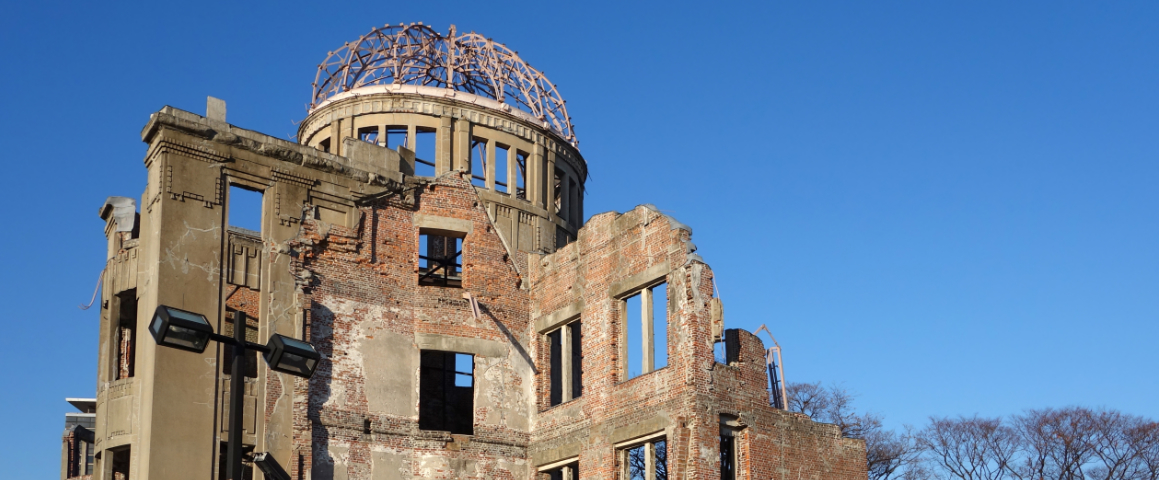Hiroshima-Nagasaki Day: Time for disarmament!
PV staff
Most people in Canada believe the country is a non-nuclear weapons state. After all, nuclear weapons aren’t built, stored, tested or deployed here. It’s a comforting feeling – justifiably so – and one that the government enjoys stoking. But it’s not completely true.
For starters, Canada has a recent history of enthusiastically supporting nuclear weapons, including deploying them here. It’s only been since 1984 that there have been no nuclear arms stationed in Canada. From 1963 to then, there were four tactical nuclear weapons systems in this country which deployed several hundred nuclear warheads. And it wasn’t just in Canada – as Yves Engler writes, “At the height of Canadian nuclear deployments in the late 1960s the RCAF had between 250 and 450 US atomic bombs at its disposal in Europe. Based in Germany, the CF-104 Starfighter, for instance, operated without conventional weapons and carried nothing but a thermonuclear warhead.”
Ah, but that all changed when nukes were withdrawn in 1984, right? Not quite. Even after 1984, Canada has continued to actively participate nuclear weapons development and proliferation, through its membership in NATO and NORAD. As a member of NATO’s Nuclear Planning Group, Canada not only supports but actively maintains and administers NATO’s nuclear arsenal and its aggressive first-strike policy.
As an ongoing funder (to the tune of over $600 million) of the Joint Strike Fighter program, Canada has actively and knowingly contributed to the development of the F-35 fighter jet and the B61-12 nuclear bomb which it is specifically designed to carry. As a purchaser of the F-35, Canada will actively and knowingly become part of the multinational delivery mechanism for this US nuclear bomb.
If this active funding and development of nuclear arms and delivery systems were not enough, the Canadian government has also worked to stall and derail international efforts at nuclear disarmament.
One of the most important recent breakthroughs in the area of disarmament and non-proliferation is the Treaty on the Prohibition of Nuclear Weapons (TPNW), which was signed in 2017 and came into force in 2021 after 50 countries ratified it. The treaty prohibits countries that are party to it from developing, testing, producing, stockpiling, stationing, transferring, using or threatening to use nuclear weapons. For nuclear armed states joining the treaty, It also provides for a timed framework nuclear armed states (who are party to it) to eliminate their nuclear weapons programs.
It’s a big step forward. But Canada hasn’t ratified it. In fact, since 2018 Canada has consistently voted against annual UN General Assembly resolutions calling on all states to sign and ratify the TPNW. The current Liberal government even rejected a 2022 parliamentary petition calling on Canada “to break with NATO’s nuclear policy and immediately sign and commit to ratifying the TPNW,” with Foreign Affairs Minister Mélanie Joly insisting that “a step-by-step approach to nuclear disarmament remains the most viable pathway to achieving meaningful and lasting progress.”
In the leadup to the TPNW, the Canadian government repeatedly tried to derail the process. The International Campaign to Abolish Nuclear Weapons (ICAN), which won the Nobel Peace Prize in 2017, notes: “In 2016, Canada voted against the UN General Assembly resolution that established the formal mandate for states to commence negotiations on ‘a legally binding instrument to prohibit nuclear weapons, leading towards their total elimination.’” ICAN further states: “In a document sent to NATO members ahead of the vote, the United States ‘strongly encourage[d]’ members, including Canada, to vote against the resolution, ‘not to merely abstain.’ In addition, it said that, if the treaty negotiations do commence, allies and partners should ‘refrain from joining them.’”
Clearly, Canada supports the retention, development, proliferation, testing, stockpiling, use and threat to use of nuclear weapons. And why? The answer is frustratingly simple – because of the country’s military alliance and integration with the United States, which includes its membership in military alliances like NATO and NORAD.
A 2021 public opinion poll found that nuclear weapons are a far greater concern for people in Canada than government actions would suggest. Specifically, there is a groundswell of support for disarmament, including through divestment in companies involved in nuclear weapons.
At a time when the Canadian government is preparing to purchase 88 nuclear weapons capable fighter jets, which both the F35 and Super Hornet are, a large majority (80 percent) of people polled said that there needs to be more work on a global level to eliminate nuclear weapons. This includes 74 percent who indicated that Canada should sign and ratify the TPNW, even if it comes under pressure from the US or NATO to not do so.
This popular view is clearly at odds with the Trudeau government, which is working overtime to drum up public support for increased funding and support for NATO and NORAD, and for increased arms race generally.
This month, as people from across Canada and around the world pause to remember the horrors of the atomic bombing of Hiroshima and Nagasaki, it’s worth remembering also that this country continues to be guided by policies which would see those horrors inflicted again.
It is time for Canada to sign the TPNW. It is time for Canada to get out of NATO, NORAD and all aggressive, imperialist military alliances. It is time for comprehensive nuclear disarmament. One atomic bombing is too often.
Get People’s Voice delivered to your door or inbox!
If you found this article useful, please consider subscribing to People’s Voice.
We are 100% reader-supported, with no corporate or government funding.




